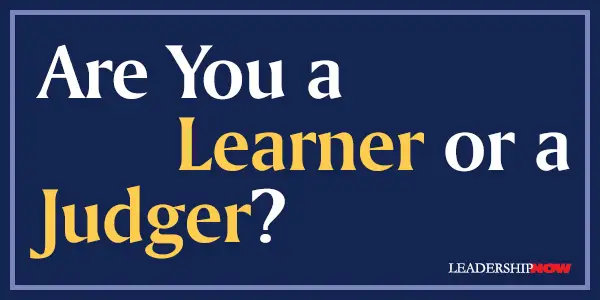 |
 |
08.22.22

Are You a Learner or a Judger?
IN SITUATION after situation, we are faced with the choice of adopting a Learner mindset or a Judger mindset. The Judger mindset comes quite naturally to us. We all do it. And we have Learner moments as well. The Learner mindset opens us up to possibilities while the Judger mindset leaves us, at the very least, in an unproductive state. The Learner mindset is a choice. The Judger mindset is a reaction to our circumstances. The trick is to be mindful of the path we are on and make the appropriate adjustment. We make that adjustment by changing the questions we are asking. That is the premise behind Marilee Adams’ book, Change Your Questions, Change Your Life. Marilee offers a helpful Choice Map to help us to zoom out and look at where we are at any given time and make the most productive choice. As a leader and coach, it is important to understand that “you can’t help anyone from a Judger place.”
It is worth rereading that last paragraph. We struggle to grow because, as she writes, “Much of what we experience can just seem true or real or logical to us. We go along as if what we experience is the way things are.” To lead is to be aware of that fact. When there is conflict, the Judger element is there. “Whenever two people find themselves in conflict, whoever wakes up to their own Judger has the ability to turn the situation around.” Judgers and Learners ask different questions. If you are on a Judger path, you need to change your questions to switch to the Learner path. Judger questions constricting questions and sound like this: What’s wrong with me?
On the other hand, Learner questions are expansive, energizing questions that sound like this: What happened?
With the Judger agenda, the costs can be tremendous. The future can only be a recycled version of the past. If you’re working from the Learner program the power is on. The juices is flowing. You can make a new future for yourself. Marilee makes an important distinction between having good judgment and being judgmental. Good judgement is essential, but judgmentalism is destructive. “Exercising judgment is about thinking things through and making informed choices.” But being judgmental is about “fault-finding or being critical or dwelling on the negative.” She adds that the “Judger mindset is the enemy of good judgment.” When you think Judger, think judgmental. If we can accept the fact that we gravitate to Judger and choose Learner, we can make progress by changing the questions—asking switcher questions like: Am I in Judger mode? Is this what I want? Ho else can I think about this? Marilee has also developed a workbook to help work through triggering situations and adapt and develop a learner mindset. It’s a helpful companion to the book. In the workbook, she outlines the Judger and Learner attributes. The chart below is very useful in understanding the change your questions, change your life program.
Judgmentalism limits our leadership. Our influence is diminished as it puts distance between ourselves and others. 
Posted by Michael McKinney at 06:40 AM
|
BUILD YOUR KNOWLEDGE
 

How to Do Your Start-Up Right STRAIGHT TALK FOR START-UPS 
Grow Your Leadership Skills NEW AND UPCOMING LEADERSHIP BOOKS 
Leadership Minute BITE-SIZE CONCEPTS YOU CAN CHEW ON 
Classic Leadership Books BOOKS TO READ BEFORE YOU LEAD |